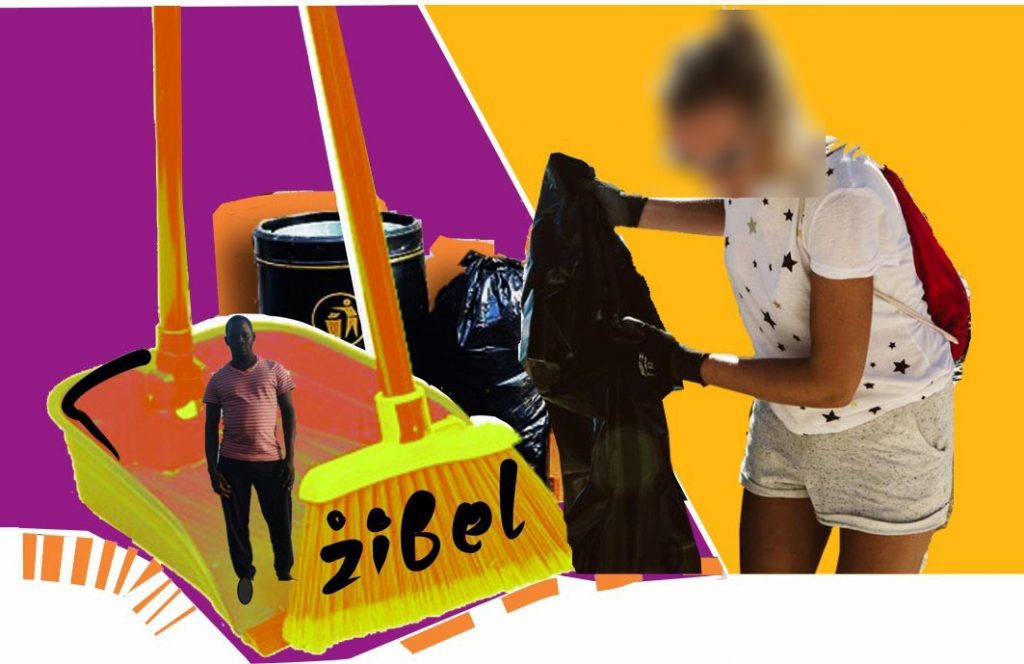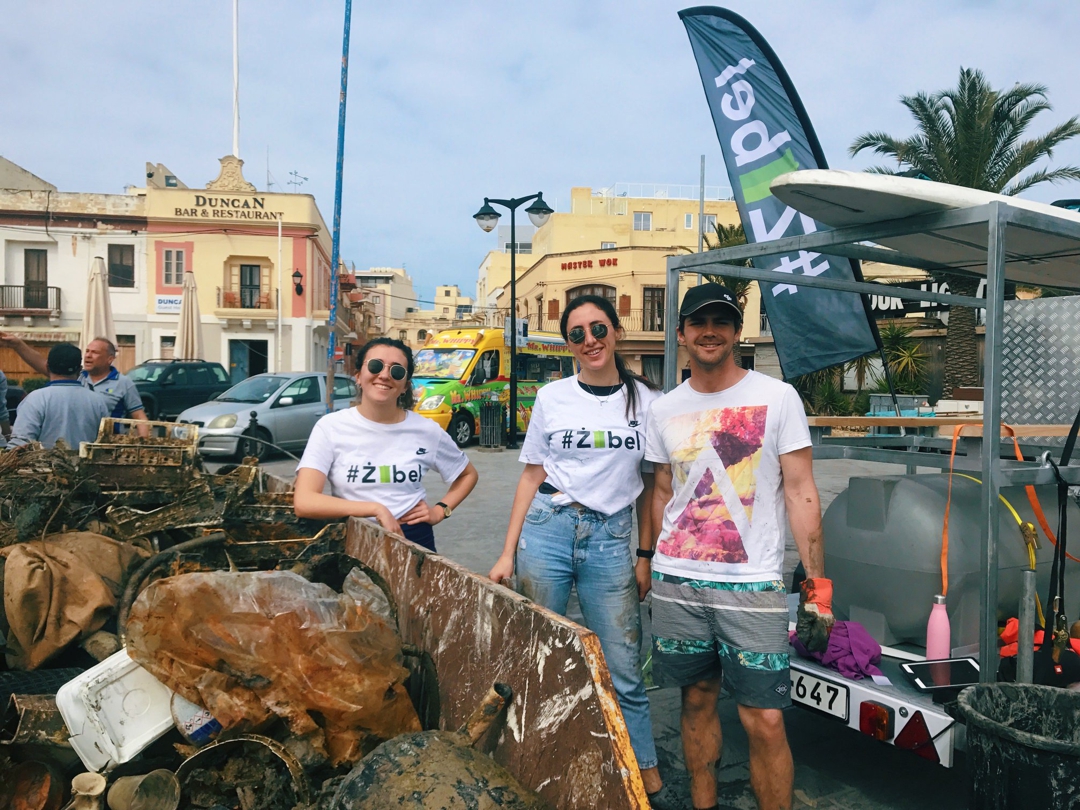
Picking up rubbish can be perceived differently depending on the circumstances… and skin colour of those doing the cleaning.
by Kathrin Schödel
Collage by the IotL Magazine
[dropcap]F[/dropcap]or me, one of the strongest direct reminders of privilege, my own privilege, of racialized and class inequality, is when I walk to work through Valletta in the morning: having mostly tasks of teaching or research ahead—topics I feel passionate about and which I can pursue in a relatively autonomous way—I often pass a young black man cleaning the street. His movements are different from the hectic crowd of white people walking to offices and shops in Valletta or, like me, commuting from Valletta.
Joseph Muscat’s recent statement drew attention to the work of those “picking up rubbish”.
Many have reacted with a well-meaning emphasis on the dignity of all jobs. However, this is a hypocritical statement unless it is connected to demands for radical change. If we strongly disagree with Muscat, we must admit that he simply described what is already happening: low paid jobs are increasingly done by immigrants, mostly of African origin—which is not to say that Maltese members of the working class are not being exploited, too!
On Work and Dignity
Firstly, if by dignity we mean that every kind of labour has a certain value, then we must also admit that not all types of work are equally fulfilling and some would not be chosen voluntarily by many people.
Secondly, performing menial tasks—or any one particular task—for a whole working day, every day, turns even the nicest type of activity into a mind-numbing, dull experience. We may argue that such work is important for society —and hence, dignified. We may challenge the system of values behind common perceptions of different types of work which render cleaning streets and collecting garbage as undervalued and worthless. Still, such arguments are not enough unless they translate into a material re-evaluation of this kind of labour.
If we want to emphasise the dignity of all work, we should demand higher wages and better working conditions for such work.
[perfectpullquote align=”full” bordertop=”false” cite=”” link=”” color=”” class=”” size=””]If we want to emphasise the dignity of all work, we should demand higher wages and better working conditions for such work.[/perfectpullquote]
Some of the street cleaning I have seen was unnecessarily cumbersome: picking up rubbish by hand, having to bend down frequently. If we think all work is—or should be—dignified, we should insist that technological innovations are employed for the comfort of every worker.—This is one of the many improvements a capitalist set-up thwarts: workers have to fight for technological tools being used in their best interest, while the main reason for employers to invest in new technology is, of course, to save costs, and hence, to be able to make workers redundant.
Working “Out in the Sun”: It’s a Matter of Skin Colour
For me, another scene of visible racialized and class discrimination is a building site outside my flat: as far as I can see, all the workers are black, all the people working in higher positions are white.
While the atmosphere at this particular building site seems o.k., it is still obvious that this is the hard work “out in the sun” Muscat referred to—work that often involves unhealthy strain and even dangerous tasks—as has become horribly clear with several deaths of workers in construction. If we think all work is dignified, we need to rally for a drastic improvement of health and safety regulations.—There is no dignity in dying from work.
If we are genuine in our outrage at the Prime Minister’s statement, we need to consider work in capitalism as it is, not as some idealised site for recognition or self-fulfilment for all. By definition, work in capitalism is based on exploitation, meaning that the workers never get paid all the earnings made from their work.
[perfectpullquote align=”full” bordertop=”false” cite=”” link=”” color=”” class=”” size=””]If we think all work is dignified, we need to rally for a drastic improvement of health and safety regulations.—There is no dignity in dying from work.[/perfectpullquote]
Workers are employed to generate profit and not to either make a contribution to society nor to grant them an opportunity for experiencing human dignity. In the majority of cases, the contribution is to the profit and the consumption of the few, not to society as a whole, and dignity, if achieved, is a lucky side-effect.
But dignity has to be wrested from alienation, from work that is not autonomous, whose result is not for the worker—the builders I can observe from my window will most probably never be able to use the building they are restoring, the street cleaner will not join the leisurely crowd enjoying Valletta.
If we really think the statement by Muscat is shocking, we have to fight for higher wages for everyone so that different types of work do not lead to further social stratification, be it racialised or classist. We have to fight for a radically different organisation of work, where, indeed, the dignity of work can be restored. We need a society where each worker can influence and change their working conditions, where they work fewer hours and have enough time to pursue activities that they themselves find most fulfilling and dignified.
This ultimately means that the organisation of work must move away from the capitalist mode of production.
Beach Cleanup Activists vs Garbage Collectors
There have also been reactions to the Prime Minister’s statement which emphasised the importance of the voluntary work of beach cleaning, celebrating it as a civic contribution by Maltese and foreigners. “We don’t need foreigners to clean our country. We need every single resident to do it, every day, as a habit taught in every instance of their life”, wrote Camilla Appelgren, an MEP candidate from the Democratic party.
This comment, no matter how well-meaning, downplayed the discriminatory focus on race implied in Muscat’s statement; it also pointed out another stark contrast: picking up rubbish can be perceived differently depending on the circumstances.

Beach cleanups performed by predominantly white (and often middle class) persons can be a source of civic pride and are regarded as an act of ‘heroism’ by other members of Maltese society.
Those who have the time to engage in voluntary activities, who can, indeed, enjoy the good feeling of contributing to society, are treated with admiration, while the worker who has to clean streets to earn a living does not receive a tiny portion of that praise. Appelgren also argued against such prejudice, but what is the cause of these predominant reactions?
It is no secret that racist discourse labels Africans living in Malta as ‘żibel’ or garbage. They are often looked at with disgust and disdain—almost as a form of visual pollution, as filth that has to be washed away. The racist discourse that renders human beings as garbage, stripped of any worth, matches the role of collecting garbage. Following this despicable logic, garbage trucks are the place where they naturally ‘belong’. This is the kind of discourse justifying a racialized class system.
[perfectpullquote align=”full” bordertop=”false” cite=”” link=”” color=”” class=”” size=””]The racist discourse that renders human beings as garbage, stripped of any worth, matches the role of collecting garbage. Following this despicable logic, garbage trucks are the place where they naturally ‘belong’.[/perfectpullquote]
However, also the well-meaning contradiction to such views, the emphasis on the dignity of all work and on civic responsibility can help to mask the reality of existing social relations and inequalities.
We are all members of a shared civil society who should want a clean country and contribute to the common good? No, we live in a class society, where some (privileged) people can afford to carry out voluntary work in their free time, and others have to do whatever work is available for them in order to survive, leaving them little free time and little dignity derived from work. When the outrage at Muscat’s blatant statement will subside, the order of things will nevertheless continue: black immigrants working ‘out in the sun’, and white middle-class people enjoying a clean conscience (and a clean beach) by volunteering for a good cause.

Kathrin Schödel lectures at the Department of German, University of Malta; her research interests are literature and politics, depictions of revolutions, constructions of gender roles, discourses of migration and utopian thought. She is a member of CAUR (Centre for Applied Utopian Research).